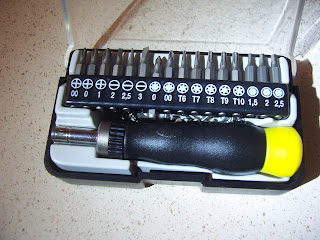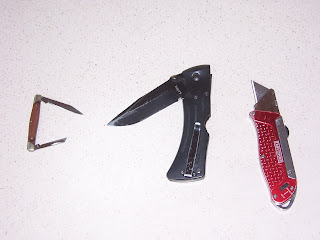*IMPORTANT NOTE* Avoid magnetic tools for use on your PCs. Magnetized things can do funky things to your hardware so avoid anything magnetic when working on computers.
I got good set of standard screw-drivers. These go a long way. They are simple and do the job right. These are an 8 piece set of Craftsman I bought on sale at a SEARS that was closing down. Clear handles are Philips Head and the red handles are Flat Head. I recommend using the largest screwdriver that fits the head. This will minimize slipping and lessen damage to the screws and driver. I use the Phillips on the far left more often than any of the others because most tower screws are a standard Phillips size.
The drivers in this picture are hand-me downs from my dad. The left one is a 1/4" drive driver and the red is a ratcheting 3/8" drive driver. In between are sets of Philips, Flat, Torx, and Hex head bits. The good thing about these bits is the variety and replace-ability. They're handy as a more compact and portable screw-driver set.
Their adapters are removable as well and can be replaced when lost, damaged, or worn out.
Close ups of the drivers, the tips, and the adapters.
This is a mini set of flat-heads, Torx, Hex, and Philips. The driver also has a ratcheting feature that comes in handy on those tighter screws. I use this most when I'm working on laptops. I scored this set at a NAPA auto-parts store. Though similar kits can be found online easily.
Here you can see the difference in size of the 1/4" drive and the mini drive set.
A close up of all the little bits.
I also use these socket head drivers for certain PC tower screws that have hex heads. These are the easiest to use because they don't slip like a how Philips or Flat tend to. They also hold the screws to them for those hard to reach spaces without being magnetic. These are more hand-me-down tools.
Close up of the socket heads.
I also find myself using these tools every once in a while. The snips on the left I actually found in a parking lot one day and they were rusted stiff. Pliers, mini-needle-nose vice-grips, and some needle nose pliers. The pliers are handy for those snap-on ends that some tower's face-plates use to attach to the front.
I soaked the snips in WD-40, scrubbed them with a steel wire brush, and soaked them again. Eventually they broke loose, cleaned up and have been a fantastic pair of snips ever since!
This one is a little unusual and I can't say I use them a lot but they sure come in handy when I do use them. These are mechanic picks. Usually used for pulling gaskets or o-rings, or whatever you might need them for. I sometimes use them on my computers to align mounting holes, to push in or pull our wires, or snap down or disengage clasps like what you find on RAM slots.
A couple of tweezers are a good idea too, they are good for removing and installing jumpers if you need to change a setting on your motherboard without disassembling everything to get to them. I also have used them to fish out dropped screws.
I knife always comes in handy. I keep the small duel-bladed on in the bay drive drawer and I use it often. I use it to cut open packages of new hardware and to cut the tips off new thermal compound tubes if need be.
A good flashlight is a must as well. I have a Maglight XL-200 I use all the time and an old hand-me-down franken-Mini-Mag that has had an LED conversion done to it.
So those are pretty much the tools of the trade for me. If you have any other clever ideas let me know, I love buying new tools!

















No comments:
Post a Comment